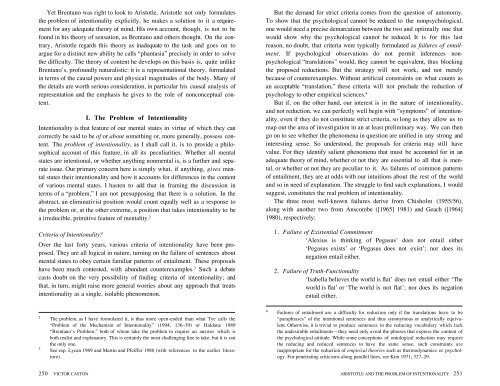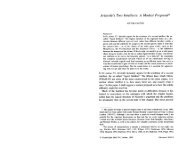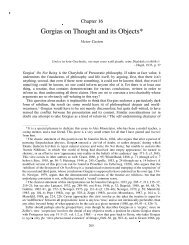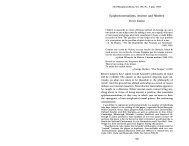Aristotle and the Problem of Intentionality. - Ancient Philosophy ...
Aristotle and the Problem of Intentionality. - Ancient Philosophy ...
Aristotle and the Problem of Intentionality. - Ancient Philosophy ...
You also want an ePaper? Increase the reach of your titles
YUMPU automatically turns print PDFs into web optimized ePapers that Google loves.
Yet Brentano was right to look to <strong>Aristotle</strong>. <strong>Aristotle</strong> not only formulates<strong>the</strong> problem <strong>of</strong> intentionality explicitly, he makes a solution to it a requirementfor any adequate <strong>the</strong>ory <strong>of</strong> mind. His own account, though, is not to befound in his <strong>the</strong>ory <strong>of</strong> sensation, as Brentano <strong>and</strong> o<strong>the</strong>rs thought. On <strong>the</strong> contrary,<strong>Aristotle</strong> regards this <strong>the</strong>ory as inadequate to <strong>the</strong> task <strong>and</strong> goes on toargue for a distinct new ability he calls “phantasia” precisely in order to solve<strong>the</strong> difficulty. The <strong>the</strong>ory <strong>of</strong> content he develops on this basis is, quite unlikeBrentano’s, pr<strong>of</strong>oundly naturalistic: it is a representational <strong>the</strong>ory, formulatedin terms <strong>of</strong> <strong>the</strong> causal powers <strong>and</strong> physical magnitudes <strong>of</strong> <strong>the</strong> body. Many <strong>of</strong><strong>the</strong> details are worth serious consideration, in particular his causal analysis <strong>of</strong>representation <strong>and</strong> <strong>the</strong> emphasis he gives to <strong>the</strong> role <strong>of</strong> nonconceptual content.I. The <strong>Problem</strong> <strong>of</strong> <strong>Intentionality</strong><strong>Intentionality</strong> is that feature <strong>of</strong> our mental states in virtue <strong>of</strong> which <strong>the</strong>y cancorrectly be said to be <strong>of</strong> or about something or, more generally, possess content.The problem <strong>of</strong> intentionality, as I shall call it, is to provide a philosophicalaccount <strong>of</strong> this feature, in all its peculiarities. Whe<strong>the</strong>r all mentalstates are intentional, or whe<strong>the</strong>r anything nonmental is, is a fur<strong>the</strong>r <strong>and</strong> separateissue. Our primary concern here is simply what, if anything, gives mentalstates <strong>the</strong>ir intentionality <strong>and</strong> how it accounts for differences in <strong>the</strong> content<strong>of</strong> various mental states. I hasten to add that in framing <strong>the</strong> discussion interms <strong>of</strong> a “problem,” I am not presupposing that <strong>the</strong>re is a solution. In <strong>the</strong>abstract, an eliminativist position would count equally well as a response to<strong>the</strong> problem or, at <strong>the</strong> o<strong>the</strong>r extreme, a position that takes intentionality to bea irreducible, primitive feature <strong>of</strong> mentality. 2Criteria <strong>of</strong> <strong>Intentionality</strong>?Over <strong>the</strong> last forty years, various criteria <strong>of</strong> intentionality have been proposed.They are all logical in nature, turning on <strong>the</strong> failure <strong>of</strong> sentences aboutmental states to obey certain familiar patterns <strong>of</strong> entailment. These proposalshave been much contested, with abundant counterexamples. 3 Such a debatecasts doubt on <strong>the</strong> very possibility <strong>of</strong> finding criteria <strong>of</strong> intentionality; <strong>and</strong>that, in turn, might raise more general worries about any approach that treatsintentionality as a single, isolable phenomenon.But <strong>the</strong> dem<strong>and</strong> for strict criteria comes from <strong>the</strong> question <strong>of</strong> autonomy.To show that <strong>the</strong> psychological cannot be reduced to <strong>the</strong> nonpsychological,one would need a precise demarcation between <strong>the</strong> two <strong>and</strong> optimally one thatwould show why <strong>the</strong> psychological cannot be reduced. It is for this lastreason, no doubt, that criteria were typically formulated as failures <strong>of</strong> entailment.If psychological observations do not permit inferences nonpsychological“translations” would, <strong>the</strong>y cannot be equivalent, thus blocking<strong>the</strong> proposed reductions. But <strong>the</strong> strategy will not work, <strong>and</strong> not merelybecause <strong>of</strong> counterexamples. Without artificial constraints on what counts asan acceptable “translation,” <strong>the</strong>se criteria will not preclude <strong>the</strong> reduction <strong>of</strong>psychology to o<strong>the</strong>r empirical sciences. 4But if, on <strong>the</strong> o<strong>the</strong>r h<strong>and</strong>, our interest is in <strong>the</strong> nature <strong>of</strong> intentionality,<strong>and</strong> not reduction, we can perfectly well begin with “symptoms” <strong>of</strong> intentionality,even if <strong>the</strong>y do not constitute strict criteria, so long as <strong>the</strong>y allow us tomap out <strong>the</strong> area <strong>of</strong> investigation in an at least preliminary way. We can <strong>the</strong>ngo on to see whe<strong>the</strong>r <strong>the</strong> phenomena in question are unified in any strong <strong>and</strong>interesting sense. So understood, <strong>the</strong> proposals for criteria may still havevalue. For <strong>the</strong>y identify salient phenomena that must be accounted for in anadequate <strong>the</strong>ory <strong>of</strong> mind, whe<strong>the</strong>r or not <strong>the</strong>y are essential to all that is mental,or whe<strong>the</strong>r or not <strong>the</strong>y are peculiar to it. As failures <strong>of</strong> common patterns<strong>of</strong> entailment, <strong>the</strong>y are at odds with our intuitions about <strong>the</strong> rest <strong>of</strong> <strong>the</strong> world<strong>and</strong> so in need <strong>of</strong> explanation. The struggle to find such explanations, I wouldsuggest, constitutes <strong>the</strong> real problem <strong>of</strong> intentionality.The three most well-known failures derive from Chisholm (1955/56),along with ano<strong>the</strong>r two from Anscombe ([1965] 1981) <strong>and</strong> Geach ([1964]1980), respectively:1. Failure <strong>of</strong> Existential Commitment‘Alexius is thinking <strong>of</strong> Pegasus’ does not entail ei<strong>the</strong>r‘Pegasus exists’ or ‘Pegasus does not exist’; nor does itsnegation entail ei<strong>the</strong>r.2. Failure <strong>of</strong> Truth-Functionality‘Isabella believes <strong>the</strong> world is flat’ does not entail ei<strong>the</strong>r ‘Theworld is flat’ or ‘The world is not flat’; nor does its negationentail ei<strong>the</strong>r.2 The problem, as I have formulated it, is thus more open-ended than what Tye calls <strong>the</strong>“<strong>Problem</strong> <strong>of</strong> <strong>the</strong> Mechanism <strong>of</strong> <strong>Intentionality</strong>” (1994, 136–39) or Haldane 1989“Brentano’s <strong>Problem</strong>,” both <strong>of</strong> whom take <strong>the</strong> problem to require an answer which isboth realist <strong>and</strong> explanatory. This is certainly <strong>the</strong> most challenging line to take; but it is not<strong>the</strong> only one.3 See esp. Lycan 1969 <strong>and</strong> Martin <strong>and</strong> Pfeiffer 1986 (with references to <strong>the</strong> earlier literature).4 Failures <strong>of</strong> entailment are a difficulty for reduction only if <strong>the</strong> translations have to be“paraphrases” <strong>of</strong> <strong>the</strong> intentional sentences <strong>and</strong> thus synonymous or analytically equivalent.O<strong>the</strong>rwise, it is trivial to produce sentences in <strong>the</strong> reducing vocabulary which lack<strong>the</strong> undesirable entailments—<strong>the</strong>y need only avoid <strong>the</strong> phrases that express <strong>the</strong> content <strong>of</strong><strong>the</strong> psychological attitude. While some conceptions <strong>of</strong> ontological reduction may require<strong>the</strong> reducing <strong>and</strong> reduced sentences to have <strong>the</strong> same sense, such constraints areinappropriate for <strong>the</strong> reduction <strong>of</strong> empirical <strong>the</strong>ories such as <strong>the</strong>rmodynamics or psychology.For penetrating criticisms along parallel lines, see Kim 1971, 327–29.250 VICTOR CASTONARISTOTLE AND THE PROBLEM OF INTENTIONALITY 251





